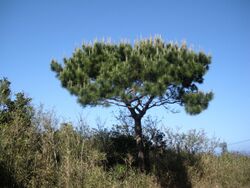Biology:Pinus luchuensis
From HandWiki
Revision as of 05:48, 27 April 2022 by imported>Unex (update)
Short description: Species of conifer
| Pinus luchuensis | |
|---|---|

| |
| A lone P. luchuensis, growing on Chichi-jima Island | |
| Scientific classification | |
| Kingdom: | Plantae |
| Clade: | Tracheophytes |
| Clade: | Gymnospermae |
| Division: | Pinophyta |
| Class: | Pinopsida |
| Order: | Pinales |
| Family: | Pinaceae |
| Genus: | Pinus |
| Subgenus: | P. subg. Pinus |
| Section: | P. sect. Pinus |
| Subsection: | P. subsect. Pinus |
| Species: | P. luchuensis
|
| Binomial name | |
| Pinus luchuensis Mayr[2]
| |
| Synonyms[3] | |
| |
Pinus luchuensis, commonly called Luchu pine[2] or Okinawa pine,[2] is a species of conifer in the family Pinaceae endemic to, and locally abundant in the Ryukyu Islands of Japan .[1][2] It was once threatened by habitat loss in the wild, where it can be found growing in small stands near windy ocean shores.[1] Having been harvested widely since the Second World War, the remaining stands are no longer commercially viable,[1] except when cultivated for ornamental use.[2]
References
- ↑ 1.0 1.1 1.2 1.3 Farjon, A. (2013). "Pinus luchuensis". IUCN Red List of Threatened Species 2013: e.T33989A2839596. doi:10.2305/IUCN.UK.2013-1.RLTS.T33989A2839596.en. https://www.iucnredlist.org/species/33989/2839596. Retrieved 16 November 2021.
- ↑ 2.0 2.1 2.2 2.3 2.4 Pinus luchuensis was originally described and published in Botanisches Centralblatt 58: 149. 1894. {{citation | mode = cs1 | title = Pinus luchuensis | work = Germplasm Resources Information Network (GRIN) | url = | publisher = [[Organization:Agricultural Research ServAgricultural Research Service (ARS), United States Department of Agriculture (USDA) | access-date = December 7, 2011 }}
- ↑ "Pinus luchuensis Mayr". The Plant List; Version 1. (published on the internet). Royal Botanic Gardens, Kew and Missouri Botanical Garden. 2010. http://www.theplantlist.org/tpl/search?q=Pinus+luchuensis.
Wikidata ☰ Q975887 entry
 |


